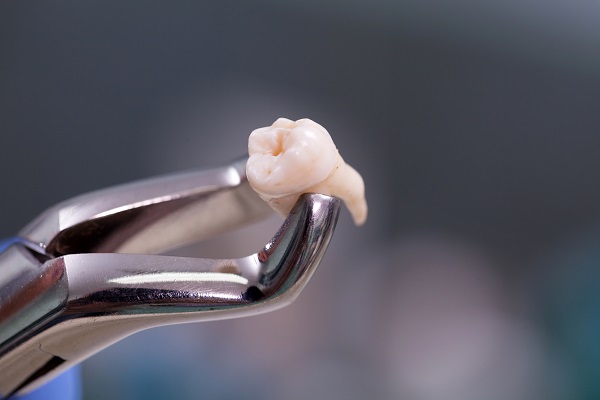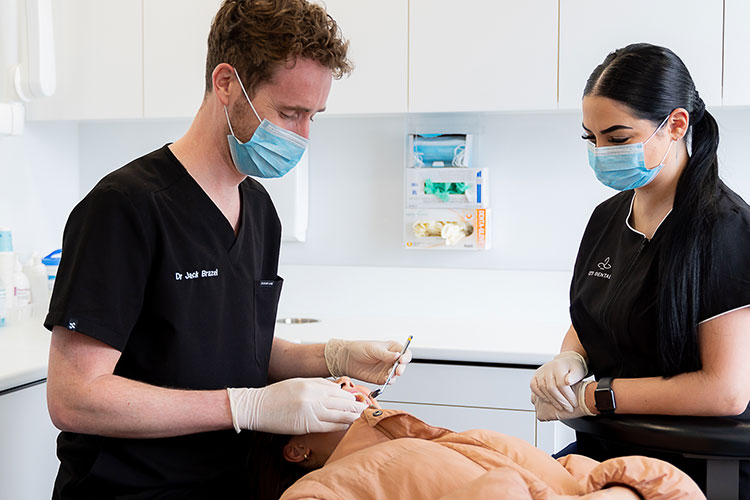What are
Wisdom Teeth?

Wisdom teeth, also referred to as third molars, are the teeth that grow at the back of the mouth, and are typically the last teeth to emerge. Usually, wisdom teeth emerge in the late teens or early twenties. Eventually, most people end up having four wisdom teeth, with one tooth distributed in each corner of the jaws. By the age of 28 years, most adult teeth have taken their position. Often, there is inadequate room in the mouth for wisdom teeth to develop properly.
The outcome is that wisdom teeth may emerge at an odd angle, fail to emerge fully, or get stuck, resulting in impacted teeth. However, not everyone has wisdom teeth issues. Some people also develop normal wisdom teeth that show no complications. If complications arise, however, wisdom teeth extraction is a necessary procedure.
Wisdom teeth extraction is a fairly common surgical procedure. It usually involves the removal of one or more wisdom teeth. If impacted teeth become painful or infected, it is critical to have them extracted. It is advisable to visit a dentist if wisdom teeth begin causing pain as the dentist will give proper advice on whether the tooth needs to be extracted. Initially, the dentist does an X-ray of the mouth to ascertain the need to extract a person’s wisdom teeth. The X-ray gives the dentist a clear view of how the teeth are positioned.
Why are
Wisdom Teeth Extracted?
Even with impacted teeth, some experts believe that there is usually no need to extract wisdom teeth because of the risk of complications. However, if the impacted teeth cause problems, then extraction is highly recommended. In some cases, impacted wisdom teeth or partially emerged wisdom teeth tend to cause dental complications.
Such teeth also make it easy for food and bacteria to get lodged making them susceptible to the development of plaque. Subsequently, plaque can lead to gum disease, tooth decay (dental caries), abscess, or cysts. Usually, such problems can be treated with the use of antiseptic mouthwash and antibiotics. If such treatments fail to mitigate the problems affecting wisdom teeth, dentists recommend the extraction of wisdom teeth.
Wisdom teeth are also extracted if there is inflammation of tissue surrounding the affected teeth, a condition commonly referred to as pericoronitis. Since wisdom teeth are not essential for biting, they can be extracted without adverse consequences.
Possible
Complications after Extraction
Similar to other medical procedures, complications can arise after extraction. However, the risk of complication in most surgeries is minimal. In very rare cases, the individual may suffer damage to the sensory nerve (especially for older patients) that is responsible for delivering sensation to the tongue and lips.
Additionally, one may suffer infections, dry socket, or sinus complications. Usually, damage to the sensory nerve wears off after a few weeks or months. In rare circumstances, there could be a permanent alteration in sensation. Dry socket occurs when a blood clot does not adequately develop in the tooth socket or if blood clots get dislodged.
It is prudent to visit the dentist if there are signs of infection or if the bleeding gets out of control. Other signs that warrant one to go back to the dentist for immediate review include fever, pus oozing from the socket, and severe pain that is not responding to pain medications.
Post-Treatment Care
Following surgery, it is important to rest the remainder of the day and only resume routine tasks the following day. However, it is vital to avoid strenuous tasks the week after surgery as it can dislodge the blood clot from the socket. To manage the pain, it is advisable to adhere to the pain medication the dentist prescribes.
Further, dentists advise patients to consume ample amounts of water after surgery. Alcoholic, carbonated, caffeinated, or hot beverages should be avoided at least 24 hours after surgery. Drinking using a straw is also ill-advised because the suction can interfere with the blood clot’s integrity.
In regards to maintaining hygiene in the mouth, it is advisable to avoid brushing teeth. Instead, one should rinse the mouth with mouthwash for the first 24 hours. Afterward, it is recommended to rinse the mouth with warm, salty water every few hours and especially after eating. The dentist will advise the ideal time to get back to normal brushing to avoid irritating the surgical wound.

We create beautiful smiles with our experienced dental team!
Call us or book your appointment today.
FAQ’s
How much does it cost to have a wisdom tooth removed?
It is difficult to put a specific price tag on wisdom tooth extraction. The final cost depends on many factors, including the complexity of the case. Some extractions are relatively straightforward that they are performed in the chair. Therefore, they cost less. For more complex cases, the price goes up based on the service required and your location.
For example, it can cost you around $300+ for simple removal if you’re under general anaesthetic. A local anaesthetic is often more expensive, reaching $500 or more per tooth.
Does health insurance cover wisdom teeth extractions?
Since wisdom tooth removal is not exactly affordable in the country, patients look for ways to save. One option is through a health insurance policy. To answer the question, it depends on your health insurance. If you have a high level of extras cover, there is a good chance that you can use insurance to take care of the fees.
An impacted tooth is covered in some instances. However, most extras cover policies are only for general procedures, such as small fillings. Since wisdom teeth removal is considered a major dental procedure, it may not be covered with the extras policy. Make sure you talk to us first if you want to know more details about wisdom teeth extractions and your health insurance.
Does everyone need to have their wisdom teeth removed?
Sometimes, wisdom teeth do not cause any symptoms. Visit your dentist to know whether you need yours removed or left alone. In most cases, however, removal is required even if you do not feel pain. Wisdom teeth can lead to complications, including impaction, where there is not enough space for the tooth to erupt. As a result, it becomes impacted, growing in at an unusual angle.
Wisdom teeth may not have negative effects right now. However, it can cause damage to other teeth, especially if it is impacted. Additionally, if the spaces between molars are narrow, bacteria can form easily, increasing the risk of inflammation and gum disease, among other problems.
When is the best time to get wisdom teeth out?
Wisdom teeth usually erupt anytime from the age of 17 to 25. Most people, therefore, have the extraction before graduating high school. If you visit your dentist regularly – every six to 12 months – you will learn when it is time for a removal procedure. It is not a good idea to wait longer, since it can lead to more complications.
Teeth roots continue to grow with the increasing risk of coming in contact with a nerve. Waiting too long increases the possibility of nerve damage after the extraction.
What should I know about dry sockets or infected holes after the tooth removal?
After the extraction, a socket is formed, which is a hole in the bone. Clotting takes place to protect both the bone and nerves. A dry socket occurs when that blood clot is disturbed. The nerves and bone will be exposed to elements in your mouth, including food. This exposure often leads to an infection called a dry socket.
Patients who have gone through a tooth extraction can have a dry socket, which appears within three to four days after the procedure. One symptom of a dry socket is pain radiating to your ear, which does not go away even after taking medication.
Should I resume my regular routine after wisdom tooth extraction?
Unfortunately, there are some things you need to avoid after the procedure. You should avoid drinking coloured liquids. Start with clear beverages, a dairy base, such as ice cream and milkshakes, and soft food, including apple sauces, soups, and pancakes. Besides the changes in your diet, you should also stop working out for about three to four days to avoid aggravating the blood clot.
You should also wait at least two days before travelling, although it is safe to fly even after surgery. Note that the third to fourth day is when the discomfort peaks.
Are there alternatives to wisdom tooth removal?
Wisdom teeth can cause significant pain. You can treat it with painkillers like paracetamol. You can also use antibiotics or gargle with chlorhexidine mouthwash or warm water with salt. Swish the liquid around the infected area to alleviate the swelling and pain. Try some home remedies, as well.
If your wisdom tooth did not fully erupt, you could opt to have an operculectomy. This procedure removes the gum over the tooth. Meanwhile, if the root is close to the nerve connected to your lower lip, a coronectomy may be suitable. A coronectomy removes the crown of the tooth.
How soon will I recover from wisdom tooth removal?
If you have school or work, you may need to take a week off. Arrange your schedule beforehand, especially if you have a child or pet to take care of. Most patients can return to their normal activities after a week. However, it is quite common for some people to still experience pain and swelling even after a few weeks. Discomfort is a normal effect of the surgery. Be sure to tell your dentist if you experience unusual issues, such as pus discharge and severe pain.
Always come in for a regular check-up so that the 123 Dental team can keep an eye on your wisdom teeth.



